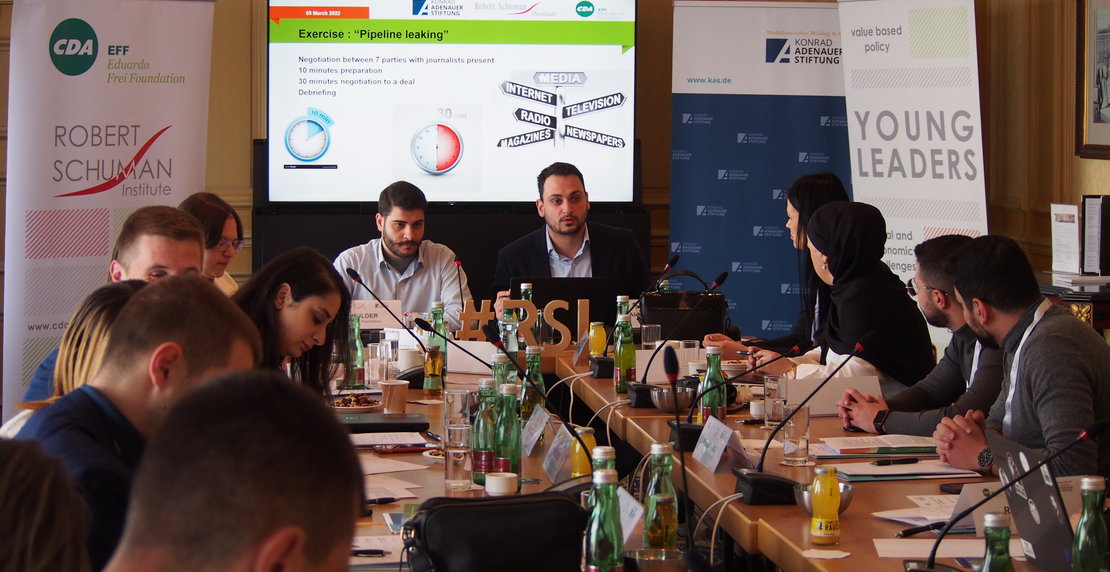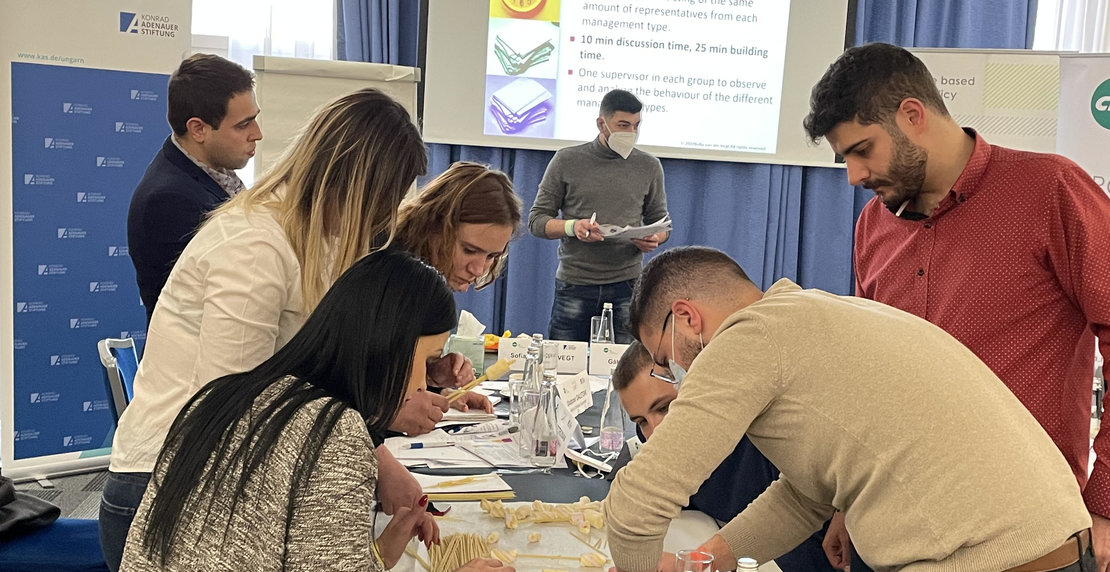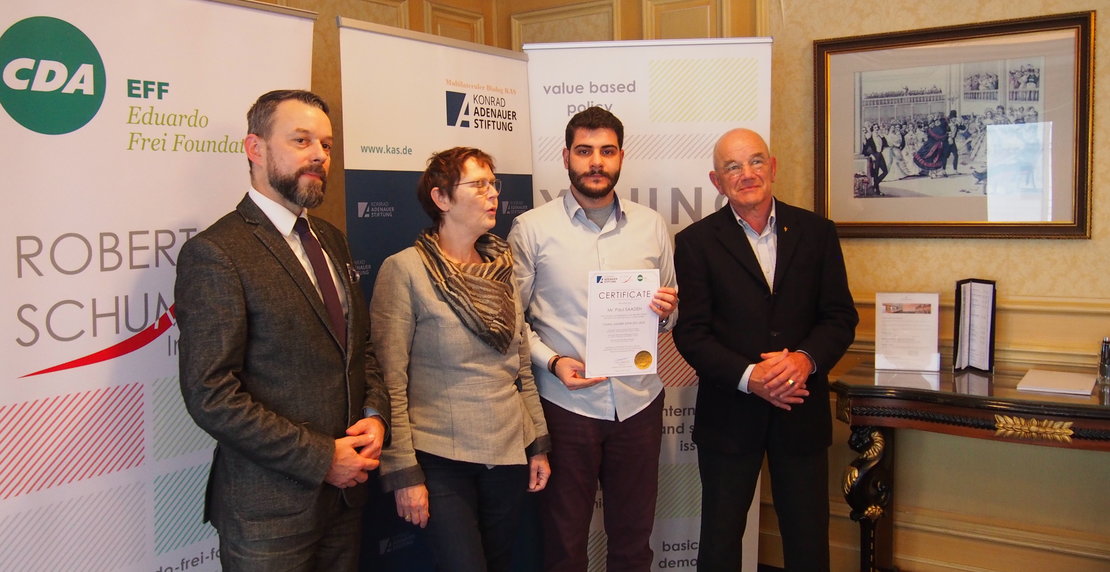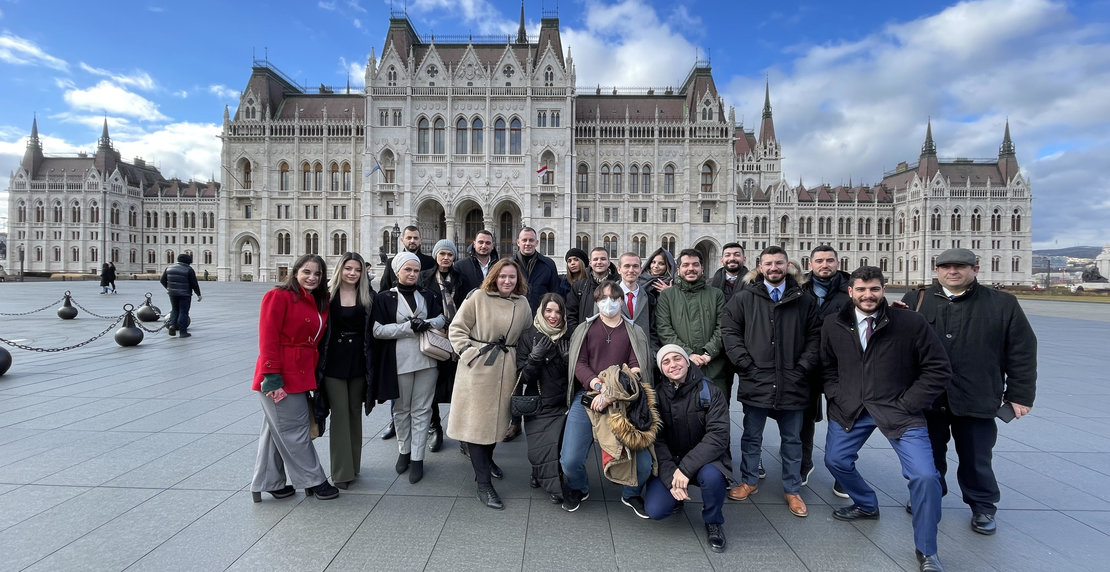
Paul Saadeh from Lebanon
About Paul
“My name is Paul Saadeh, I am 27 years old and I live in Zgharta, a small city in the North of Lebanon. I have a study background in Law & Finance, and after having walked through a traineeship of 3 years, I am now a fully qualified lawyer. Recently I also started a new job as project manager at the Konrad Adenauer Stiftung (KAS) for the Rule of Law programme Middle East and North Africa. Next to this, I am also politically and socially active, especially in my hometown. I’m a member of the party called Lebanese Forces, where I am the international secretary of the youth association (LFYA).”
What does Democracy mean to you?
“From a traditional definition, democracy means that the people hold the power. But I also would like to highlight two facets of democracy which are important to me. First, on a micro-level, individual freedom and hearing the voice and opinion of all people is crucial to me. In a democratic society, each individual has the responsibility and duty to protect this freedom. On a macro-level, I think democracy is also a reflection of the people. When, for example, we have a corrupt government, this also reflects something in society since the people elected this political elite.”
What developments do you see that are shaping democracy, in a positive or negative way, in your country?
“The constitution clearly states that Lebanon is a democratic state and Lebanon has a long democratic history, which distinguishes the country from other states in the Arabic region. Furthermore, Lebanon has been one of the founders of the Arab league and the United Nations and played a pivotal role in the drafting of the Universal Declaration of Human Rights (UDHR) with the involvement of Charles Malik.
However, in the recent past, we also had a ruling majority that has tried to stop the democratic process. After the parliamentary elections of 2009, the majority of the parliament decided to extend their own mandate without referring to the people, and they were successful in postponing these elections for another five years, meaning we had parliamentary elections in 2018 again. Furthermore, in some regions, groups such as Hezbollah – an Iranian Shiaa Militia - have control without any opposition and people are not fully allowed to express themselves freely. In this sense, we can say that democracy is threatened by behaviors by groups such as Hezbollah internally. Externally, our neighboring countries have an influence on our democracy. They often try to influence the Lebanese national political sphere by influencing political parties to abide by their will, which is not beneficial for our country nor our democracy.”
What do you like about politics and what motivates you to be active in politics?
“I define myself as Lebanese, but I am also a Maronite Christian. In Lebanon, the Christian community endured a lot during its history, and it was persecuted many times. Lebanon is the last place in the middle east where we have a big Christian community which is politically active and present on the national level. Being a Christian guy living in an Arab country in the middle east is not something easy. What motivates me is to keep ‘fighting’ for my own and my community's freedom and our presence in the country. To be able to live in a free country where people can be themselves and have room to prosper without any threats to their existence.
Furthermore, after the civil war (1975 till 1990), a lot of parents pushed their children away from politics, because politicians were seen as corrupt people. Politics has a very negative connotation in Lebanon, and personally I always try to change this mentality in my community. In my opinion, we cannot have a democratic state without representatives and political parties. Therefore, I always try to motivate the people around me to be politically active and change their minds about politics.”

What is the thing you want to change in your country?
“In Lebanon, we have 18 different religious groups and communities, which means we have 18 different minorities. To spread a feeling of safety among those minorities, each minority should be respected. This said, I think that governing the country by using a centralized setting is obsolete. A centralized government, in my opinion is not able to produce such prerogatives, thus heading towards a full scale decentralization is paramount to the prosperity of the country and for its stability, especially if we want to encourage the diaspora to invest in the country and to one day come back. To wrap up I can say that “la raison d’être” of Lebanon is to try to maintain and respect each cultural group’s particularities and differences - whenever a single minority tries to take over the power at the expense of other minorities, problems and tension rise up, which is what is happening in the country right now by having the Shiaa Muslim community, controlled by Hezbollah, trying to have hegemony over the other minorities and the entire Lebanese state.”
What kind of support would you, or other young people in your country, need more?
“Currently, we are going through an economic crisis, so these are exceptional times. The youth are leaving Lebanon to find work elsewhere, to find a new future, because they seek stability. Besides the economic support we need, I think what we lack the most is stability, that can only be procured by moving towards a decentralized state and an international recognition and approval of Lebanon’s neutrality - Lebanon is a small state that has no power to be part of any kind of axes in the region. Of course, this is something that should be provided on a national level and the political elite should have the will to do so. However, the international community can of course help with this by pressuring the political elite and providing support where possible.”
What is the added value of trainings (from organisations like the EFF) to your (political) development? Why is it so important that you follow these trainings
“In Lebanon, we have a trend of people leaving the country for Western (European) countries, to study and work there and then come back to the country. By providing trainings from speakers and trainers all over Europe and our region, we benefit from the knowledge and experience from people from these countries. The training and organization bring us the knowledge that we lack. Learning about the political systems and receiving political and economical lessons learned from different places can help us to build a brighter democratic future for ourselves. Furthermore, meeting new people from different countries, who might think differently, brings new perspectives and opens your mind to new ideas. A lot of people who have been trained end up in (important) political positions. Providing them with this knowledge and baggage, will help them fulfill their duty.”



